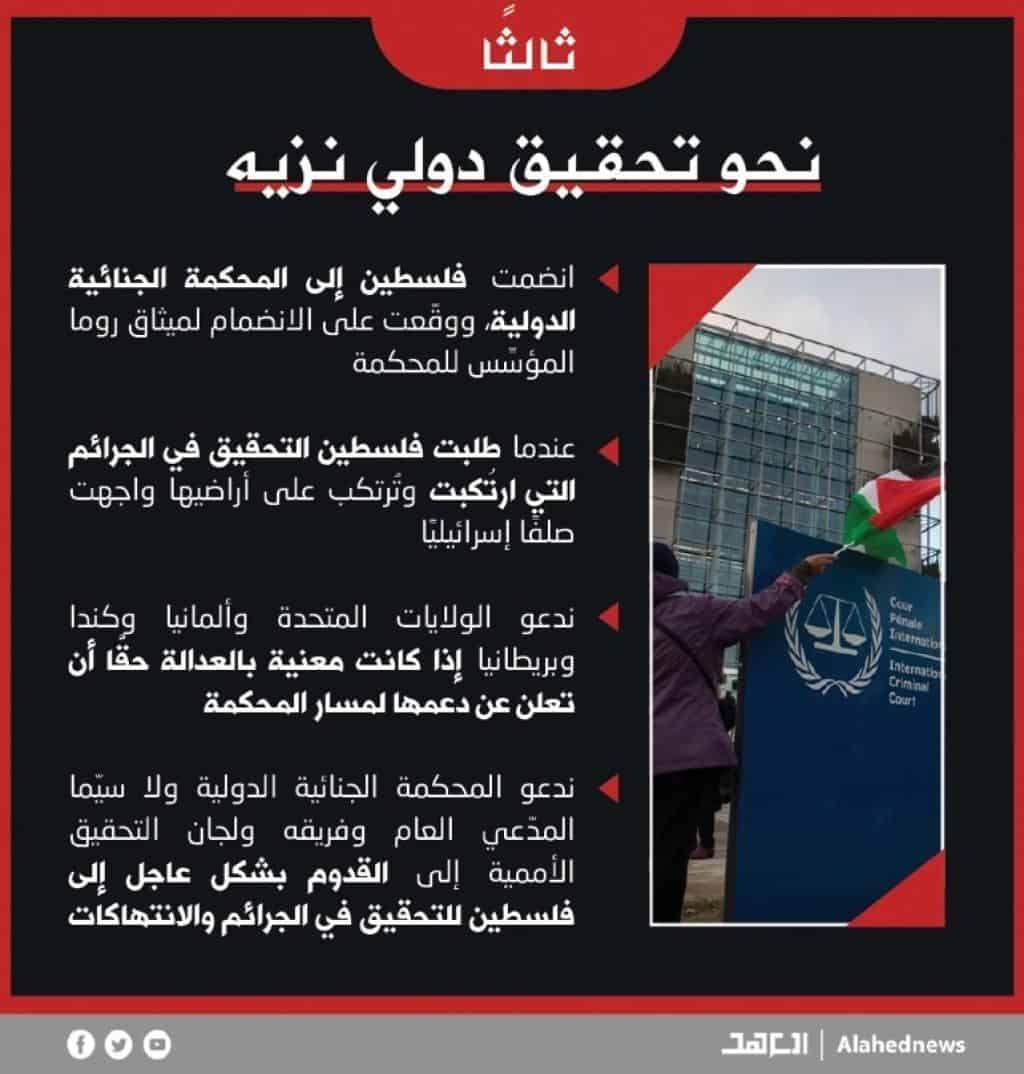Part two in a three-part series. You can read part one here.
Increasing International Pressure on Israel

Third — Toward Impartial International Investigation
- Palestine joined the International Criminal Court, and ratified its joining of the Rome Statute which created the Court
- When Palestine requested investigation into the crimes committed and still being committed on its lands, it faced Israeli opposition
- We call on the United States, Germany, Canada, and Britain — if they are truly interested in justice to support the ICC’s course
- We call on the International Criminal Court, particularly the prosecutor and his team and the international investigation committees to quickly go to Palestine to investigate the crimes and abuses
Analysis
Conceptually and ideologically, Hezbollah has no respect for international law. It understands these laws as part and parcel of the liberal world order that underpin American global hegemony – an order which it ideologically abhors as inherently morally bankrupt. In just two of his recent speeches, Nasrallah described “so-called international law” as upholding “the law of the jungle that rules this world,” and mocked international law as a system “incapable of protecting any people.” Hezbollah’s relationship with international tribunals is a testament to the scorn in which the organization holds international law, including its refusal to acknowledge the legitimacy of the Special Tribunal for Lebanon and threats issued against those who would try to enforce its decisions against the group. More recently, Nasrallah cast doubt on the International Court of Justice’s independence and impartiality, claiming that it, like all other international tribunals, was controlled by “the American administration, the West, Europe, and all the other protectors of this barbaric, Nazi, racist Entity.”
It seems perplexing then, for Hezbollah to be appealing to the ICC. However, when convenient, Hezbollah and the rest of the Resistance Axis will not make appeals to “human rights” and “international legitimacy [al-shar’iyya al-duwaliyya],” – and this instance is no different.
Hezbollah and its partners have adopted a goal – mentioned above – to stop the Israeli war effort in Gaza. Their goal, stated by Nasrallah, is that “the Palestinian resistance, specifically Hamas, be victorious in Gaza…” But, their bombast aside, Hezbollah recognize the Israel Defense Force’s military superiority, and the very real likelihood that – left to its devices – the IDF will defeat Hamas and its partners. So they have adopted a strategy of concentric circles that mixes both psychological and kinetic elements to halt the IDF’s advance.
The innermost circle is kinetic pressure on the IDF itself, carried out by Hamas and its partners. The second circle leans on the fact that Israel is a democracy, where the military answers to the political echelon – which, in turn, is answerable to the electorate. Here is where the Gazan terrorist organizations are using the hostages, to try to induce the Israeli public to call for a ceasefire. In part, this second tier of this strategy also relied upon making the Israeli Home Front feel unsafe through continued rocket attacks. While those have largely abated from Gaza, Hezbollah has picked up the slack by rocketing the north and displacing an additional 80,000 citizens. The third circle involves pressure and attacks on the United States, raising the stakes for Washington for Israel’s continued war effort – which can then, in turn, theoretically bring Israel to heel by direct pressure, halting weapons resupplies, or allowing a UN Security Council-sponsored ceasefire to go into effect. Failing that, the final circle involves pressure on and from the international community. This is where Houthi attacks on Red Sea shipping come into play, as well as legal pressure.
Taking Israel to court over exercising self-defense has the benefit of delegitimizing the very concept of Israel exercising force in self-defense. This goal is accomplished by putting Israel or its actions on trial. To that end, commenting on the ICJ case, Nasrallah said, “the outcome is irrelevant,” saying what was important was “the sight of the Enemy Entity as a defendant in front of the sight of the entire world, having a list of legal accusations presented against it based on truths and damning evidence.” In effect, Israel will be condemned in the court of public opinion by the very fact of – say – being accused of genocide, irrespective of a complicated legal argument or outcome which most won’t bother to read. This, too, increases pressure on Israel to adopt an immediate ceasefire. Hampering Israel’s very ability to exercise force in self-defenses also furthers Hezbollah’s stated goal of destroying Israel in phases, by preventing it from responding to or silencing the Resistance Axis’ unyielding assaults and the threats they pose to its citizens.







